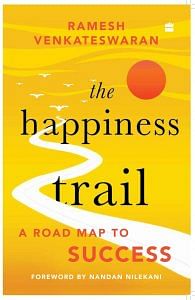India is a country that has been the cradle of civilization, knowledge and, importantly, excellence, in just about every sphere of activity. In fields ranging from architecture, construction, medicine, mathematics, metallurgy and science and technology to weaving, artisanship and philosophy, India had been the envy of the rest of the world thousands of years ago. Sadly, all this is a story, glory and legacy of the past. We know where we stand in the twenty-first century, after all the years of invasion, plunder and colonization.
We have become a ‘chalta hai’ country. Anything goes. We have become a nation that will do as little as possible to get away with just what we need to do. Our indifference to commitments, obligations—contractual or otherwise—excellence, pride in what we do, is sadly now part of our national character. This is worrisome for the country in general and for you and the future generations in particular.
This brings me to the third I—Involve. Put your heart into what you do.
Also Read: Polyamory, self-partnered, single — How young Indian women are recasting idea of love
Jugaad — a Vice Made into a Virtue
If there is any one concept or quality that harms us most today, it is jugaad. This word has become a part of the social fabric and personality of India. Management gurus and academics write books about this Indian characteristic as if it is a great management asset. Jugaad has actually worked its way into the English lexicon. We Indians have, unfortunately, turned a vice into a virtue. The Oxford English Dictionary defines jugaad as ‘a flexible approach to problem-solving that uses limited resources in an innovative way’. Academics and management pundits say jugaad is ‘frugal innovation’. This certainly gives a sense of dignity, credibility and legitimacy to a completely avoidable and harmful trait or practice.
What really is jugaad? The academic definition makes jugaad a very necessary quality for a country like ours—frugal, innovation with limited resources, street-smart. We need to be aware and beware of this, because the ground realities are quite different from what these pundits say. In real life, as I and I am sure many of us have seen and experienced, the word jugaad has a different connotation. It is about working around the system, beating the system and breaking the law if needed, to get things done—as in ‘we will do some jugaad’. I am not concerned with this interpretation at this juncture because this is a clearly undesirable quality.
The second and more common connotation is the one you should concern yourself about. You are probably already a victim of it. All types of product and service providers are constantly doing jugaad to fix problems. Typically, they are band-aid solutions to problems that should not have happened if the job had been done right in the first instance. It is a ‘fix-it’ approach. In management language, we can say it is not doing it right the first time and then fixing it the second time. I see this with students and professionals too. Typos in presentations, blind cut-and-paste jobs in reports and errors in spreadsheets are quite common. Look at our roads, buildings, services . . . We have become a nation conditioned to taking shortcuts. It is not just about beating traffic lights, cutting the roundabouts, going the wrong way on roads and one-way streets, or parking in no parking zones, but more importantly, it has pervaded almost every aspect of our personal and professional lives. Unfortunately, jugaad, the fixing of the problem, is seen as smartness. We glorify the poor uneducated guy who displays ‘so much smartness using limited resources in an innovative way’, and this is the so-called greatness of jugaad. We do not ask why the problem or error happened in the first place. This should be a matter of concern. This common attitude implies that we are not fully involved in what we do. It suggests a degree of casualness or even indifference to quality and excellence. We need to put our heart into what we do.
Also Read: Indian sex writers are too embarrassed to write well. Unlike good sex, they lack passion
Passion, Good. What About Obsession?
The words typically used to describe a situation of being completely involved and putting your heart in what we do include ‘commitment’, ‘passion’, and even ‘obsession’. Generally, when we talk of passion and obsession, the former is seen as a positive quality while the latter is not necessarily a desirable characteristic. For the purposes of this chapter, I will use obsession as a positive trait in a particular context. Let me explain.
I once heard a talk on achieving excellence by Geet Sethi, a five-time World Professional Billiards Champion. He made an interesting point about passion and obsession, saying that passion is not enough to take one to great levels. He said one has to be obsessed to be a champion. As I listened to him, my mind went back to about thirty-five years earlier, and I could relate exactly to what he was saying. In my college days I was a sportsman of decent capability and achievement. I played badminton and represented my university and state at the national-level championships. During my student days in engineering at IIT Bombay, there were many days when, after my practical classes in the afternoon, I would take the long haul by bus and local train from the IIT campus into town to play the local tournaments. After about two hours of commute each way and waiting for my match, which would often get delayed, I would return late to the campus, around midnight. The IIT routine those days was quite gruelling, with regular exams and assignments. There was no question of bunking classes or the class tests the next morning at eight thirty. It was a tough routine. But despite the tough academic and exam schedules, through my five years at the IIT, there was hardly a day when I was not on the sports field or in the badminton court in the evenings, working out or practising. This kind of routine made me proud of myself for my passion for and commitment to the game. Like many students of my time, with all my commitment to the game we would also have our flings, drinking binges, late-night parties and the like.
In my final year I was selected for the trials for the All-India Universities team. This was a big deal, because in those days the national team would have quite a few players from university teams. At the selection camp in Gwalior, we would all work out hard during the day and then fool around in the evening. I remember clearly that while many of us would sit up chatting, one person would quietly leave the crowd early and retire for the day. No late nights; no sitting around with the gang, as a good, healthy well-adjusted twenty-year-old would. We all noticed him, his actions and his commitment. The same person went on to win the national championship that year. In 1980, he became the first Indian to win the All-England Open Badminton Championships. He was ranked world’s number one player the same year. His name was Prakash Padukone.
Thirty-five years later, sitting in a seminar in Thiruvananthapuram, and listening to Geet Sethi, I clearly understood the difference between passion and obsession. I was passionate about badminton. Passion was important, and it took me to a good level. I needed to be obsessed to get to the next level of greatness. I missed it. Prakash got there.
From my perspective, obsession is about focus and single-minded purpose. It need not always be for some big goal or objective. I take you back to the earlier chapter about ‘Brand You’. Something that defines you is what you become obsessed with. It could be something as simple as having a tidy room or not allowing an untidy report to leave your office. I reiterate, I am referring to obsession in a positive context—of wanting something intensely. This obsession drives us to performance and achievement. It is not in the context of making us paranoid, where it becomes counter-productive, affecting not only our performance but also our emotional well-being.
If we look into the lives of the great people in various fields— art, science, music, technology and business—we will find that they went beyond passion to being obsessed with some idea or goal to get to where they did. Let us look at some of the most successful entrepreneurs in recent times whom I am sure we will be able to relate to. Steve Jobs of Apple. Bill Gates of Microsoft. Elon Musk of Tesla. Jeff Bezos of Amazon. Phil Knight of Nike. Or look at some of the great musicians, artists, writers and stage personalities. There are enough biographies on them. If there is a common trait to each of them it will be their obsession to pursue a goal or an idea that got them to where they finally reached.
What has obsession got to with jugaad? Everything. We Indians have to change our mindset to not settle for mediocrity. We have to get out of the ‘chalta hai’ attitude that has permeated all levels of our society. We have to stop taking shortcuts, whether on the road or in our activities. We need to get injected with some amount of obsession for excellence and pride in what we do. We need to be obsessed with not settling for second best. We need to put in our best at all times, whatever the outcome. This can happen if and only if we are actively involved in whatever we do.
 This excerpt from ‘The Happiness Trail’ by Ramesh Venkateswaran has been published with permission from HarperCollins India.
This excerpt from ‘The Happiness Trail’ by Ramesh Venkateswaran has been published with permission from HarperCollins India.



